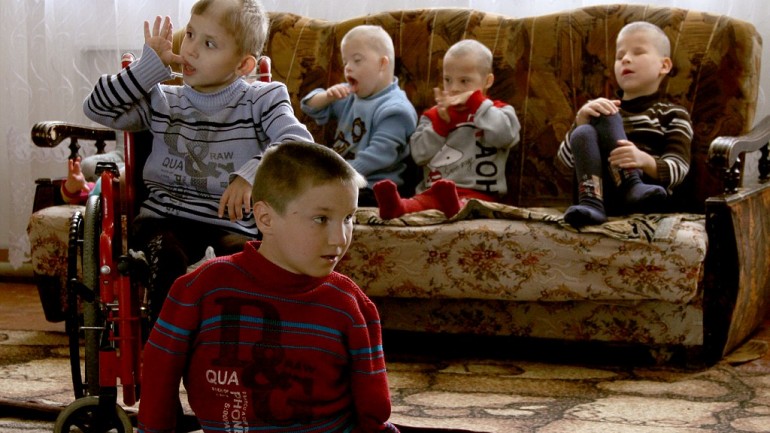Ukraine got it’s independence from the Soviet Union in 1991, under the soviet system a mother who had just given birth was able to abandon her new born baby in the maternity ward by simply signing it over to the state. Today the legacy of that system is that state care has become the norm for children with any kind of disability. As a result of this there are 10 times as many children in state care in Ukraine then there are in the UK.
Under the charter of the United Nations of which Ukraine is a founding member, everyone has basic rights irrespective of illness or disability but even when they grow up many of Ukraine’s orphans become trapped in the system with no right of appeal and no right to have their voices heard.
In this documentary we see filmmaker Kate Blewett travel to the Ukraine in search for answers as to how after two decades of independence disabled children are being cared for. Blewett also sets out to talk to young people who have grown up in state care and hear their stories.




I have been watching this for only a few minutes for the first time today.
I pray for all the little boys and girls of God in that and this moment. Glory be to God, for having the right people there to care for them; even in smallest/slightest way they know how. I thank you Christ, for your spirit with the little boys and girls on their first day of birth until now, and their time to present with God. I pray that even though there aren’t many remote care opportunities for the little ones, that they begin to receive the blessing to experience family and more love. Just the smile on some of their faces would bring a joyful tear and warming sensation in my heart. In the name of Jesus Christ, Amen.
This documentary gives you a snapshot into a real day in the life of disabled orphans of struggling Ukraine . I cant help but wonder if army toxins aren’t a part of the picture ?.
The children look to cared for as best they can be, I didn’t feel it was as miserable as Kate did . Actually I was quite touched at a few nice moments. This is real life and they get on.
Kate seems so very caring but I cringed when that doctor got a grilling , the struggling hospital is at capacity I bet !.
this starts wrong, Ukraine was created by Soviet Union, name meaning “border land”
I found this documentary very fascinating and informative. However I didn’t care for some of the high-drama small mindedness that is often associated with documentaries like this. When the girl is taken to the hospital…I believe her name is Margarita?….the narrator begins grilling the doctor for saying she will be sent home. The doctors are vilified and treated as if they have no sense of compassion for human life. The reality of the situation is that doctors have limited resources to provide their patients, and providing permanent care for chronically ill individuals may not be something their particular medical facility is designed for. Keeping one patient for a longer period of time also means denying additional service to the next high-need patient that comes along. Doctors have to strike a balance under these circumstances, and I’m sure it isn’t easy. There may be other medical facilities designed for long-term care that are more appropriate under these circumstances. Fixing these problems is hardly one dimensional, and it takes a balanced perspective to understand that. Getting angry at medical professionals and assigning blame does little to help.
Also, when the producers are discovered speaking with the gentlemen by the cornfield, they instantly start shouting and create confrontation with the wardens. Then they jump in their car and start spouting off assumptions about the punishment the two men will receive….is this rational? I’m not saying abuse of patients isn’t an issue…there are many reports of atrocities taking place in state run institutions…but is it fair to assume that all state facilities run this way?
Overall I just found parts of this documentary to be dominated by emotion and uninterested in examining the issues from a broader perspective.